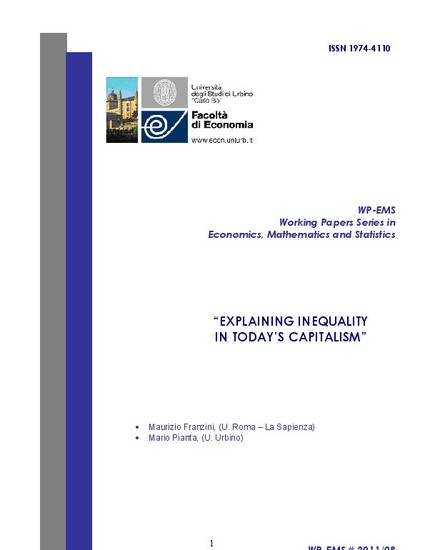
Unpublished Paper
Explaining inequality in today’s capitalism
Working Papers, University of Urbino Carlo Bo, Department of Economics, Society & Politics
(2011)
Abstract
Inequality within advanced countries has returned to levels typical of a century ago. At the global level it remains extremely high despite the rapid growth of major developing countries such as China, India and Brazil. This makes inequality a major economic issue, social problem and political challenge in today’s capitalism. However, economic inequality is the object of limited research efforts and attracts modest attention in the political arena.This is the result of several factors. Mainstream approaches view inequality as a necessary condition – or, at best, an unfortunate side effect - for achieving the more general objectives of economic growth and market efficiency. Most studies emphasise that inequality is to a large extent the consequence of international forces laying beyond the reach of policies by nation-states. More importantly, today’s inequality is the result of a variety of processes that have seriously increased its complexity, with major changes in its nature and mechanisms, compared to past decades. To the fundamental divide between capital and labour in the distribution of income between social classes and groups, new mechanisms have been added, that have fuelled income inequalities among individuals, rooted in the rise of top incomes, technological change, international production, labour markets, influence of families of origin and lack of intergenerational mobility. In this paper we propose an overall interpretation of the trajectory of inequality. The functional income distribution that leads to inequalities in factor incomes, with an increasing divide between the growing share of profits and financial rents – free to move across national borders, escape taxation and search for speculative gains – and the dwindling share of wages, nation-bound and unable to escape taxes. The specificity of top incomes – that combine rents, profits and “superstar” labour compensation complicates this picture with the effects of pro-rich policy changes. Inequalities have also strongly increased within wages, resulting from several factors. Education has an obvious influence, but plays a much smaller role than mainstream views would expect. Skill differences are increasingly important, and need to be examined in the context of specific professional groups, rather than with wide generalisations. Industry specificities, technology and international production do play a role, but in complex ways, depending on the nature of innovative strategies, local competences, market power and demand dynamics. Labour market arrangements – unionisation, presence of minimum wages or national contracts, diffusion of temporary or part-time labour contracts, etc. – are increasingly important factors in explaining the low pay of many young and low-skilled workers. Outside labour markets and the opportunities for social mobility promised by education, the family of origin remains a major determinant of individuals’ education and incomes, with an increasingly strong persistence of inequality across generations. The interpretation we provide offers a new explanation of the nature of today’s economic inequalities, of its consequences, and possible remedies.
Keywords
- Inequality,
- Distribution,
- Welfare
Disciplines
Publication Date
2011
Citation Information
Maurizio Franzini and Mario Pianta. "Explaining inequality in today’s capitalism" Working Papers, University of Urbino Carlo Bo, Department of Economics, Society & Politics (2011) Available at: http://works.bepress.com/mario_pianta/70/
